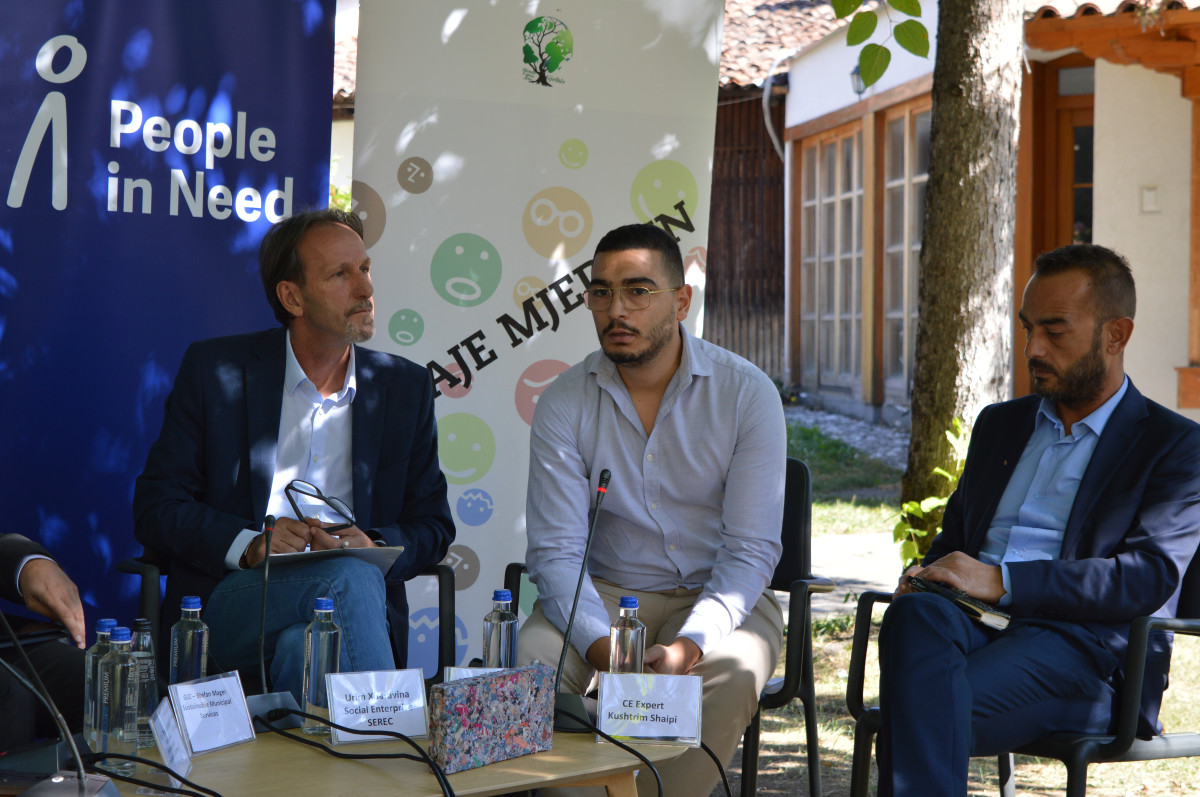Circular Economy in Kosovo: Recycling and the Journey Ahead
Published: Nov 30, 2023 Reading time: 4 minutes Share: Share an articleKosovo, one of the smallest economies in the Balkans is making strides towards a more sustainable future through the pursuit of a circular economy. At present, Kosovo's recycling rate hovers around 40%, which falls short of the EU average of 47%.

This discrepancy can be attributed to several factors, including inadequate infrastructure, limited public awareness, and a lack of financial incentives.
Kosovo Glass Recycling, a family-owned business, established in 2019, began as a neighbourhood clean-up initiative. Founder Dugagjin Berisha noticed excessive glass waste in Kosovo, coupled with a lack of glass recycling facilities in the country.
“His response was to start collect glass waste from small businesses in the surrounding area for free,” says Martin Berisha, Dugagjin’s son and sales marketing manager in the company.
SMEs, like Kosovo Glass Recycling, are pivotal players in the journey towards a circular economy. These agile and innovative businesses hold the key to reshaping the way we produce, consume, and recycle. In Kosovo, as in many regions, their role in the circular economy not only supports environmental goals, but also contributes to economic growth and job creation.
The fact that Kosovo's circular economy entrepreneurs are resilient and eager to improve their businesses while contributing to sustainability, is evident in the assessment report produced by the EU-funded project Circular Economy for Green Transition (CE4GT). It found SMEs in Kosovo operating within the circular economy facing unique challenges and opportunities. Some of the issues highlighted by these enterprises include outdated equipment, limited access to qualified staff and high staff turnover.
Kosovo Glass Recycling: A Sustainable Family Endeavor
Today, Kosovo Glass Recycling has expanded its reach, securing contracts with notable businesses in the hospitality and pharmaceutical industries. They collect industrial glass and raw materials and employ innovative methods, including turning glass waste into furniture, tiles, and highly sought-after pool filtration glass sand.
What sets Kosovo Glass Recycling apart is its spirit of self-sufficiency. Dugagjin Berisha, a construction engineer, personally engineered some of the equipment required for separating and manipulating glass. The company's commitment to sustainability is unwavering, as evidenced by its newly established sister company, which focuses on plastic recycling.
However, the journey has not been without its challenges. Finding qualified employees remains a hurdle, and access to finance is another obstacle.
Kosovo Glass Recycling has garnered international recognition, with an invitation to Brussels for the Close the Glass Loop 2023 Annual Event. This recognition underscores the potential of Kosovo's circular economy initiatives to achieve global recognition and impact.
Opportunities for Kosovo's Circular Economy: Joint Effort
As Kosovo advances on its circular economy journey, several opportunities arise, starting from the job creation and fostering of growth of businesses involved in recycling, composting, repair, and related activities.
The dependency on imported resources could be scientifically lowered by prioritizing recycling and reuse, while at the same time enhancing domestic resource sustainability. This alone can lead to improved environmental quality by reducing waste generation and pollution, contributing to a healthier and more sustainable Kosovo.
Government initiatives, despite challenges, signal a commitment to transforming the country into a more eco-conscious and resource-efficient nation. The dedication and innovation demonstrated by companies like Kosovo Glass Recycling underscore the potential for sustainable entrepreneurship in Kosovo's circular economy landscape. With continued effort, investments and collaboration with civil society organizations, Kosovo can make significant strides toward a more sustainable and circular future.
Recent panel discussion Together for Circular Economy in Kosovo held in Pristina, saw the participation of representatives of development partners – EU and GIZ, small business, civil society and solidarity economy. Panellists agreed that cooperation between all the sectors – public, private, and civil, as well as donor community and financial institutions, is necessary to create an enabling environment and conditions for the circular economy.
Martin Berisha took part as a representative of small business and reflected on the changes in the public awareness in the recent years.
The event was held as a part of the project Circular Economy for Green Transition (CE4GT), a three-year initiative that contributes towards the transition to a more circular economy in Kosovo. The project is funded by the European Union, co-funded by the Ministry of Foreign Affairs of the Czech Republic, and implemented by the People in Need and Let's Do It Peja!.



